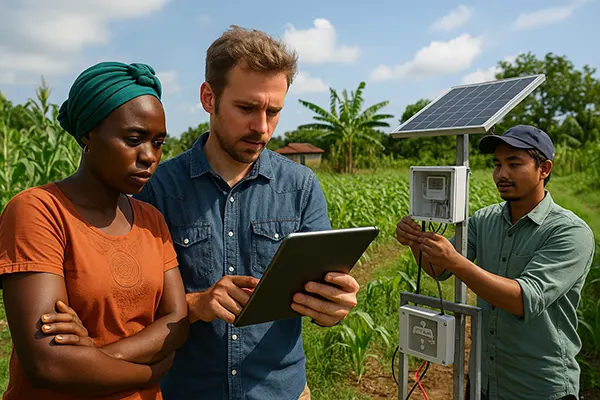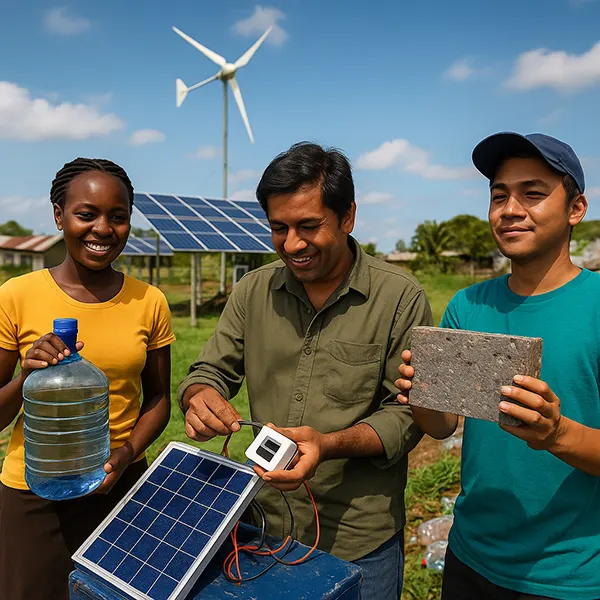
Climate Tech Startups in Developing Countries: Local Innovations for Global Sustainability
As the climate crisis intensifies, developing countries have become unexpected frontiers for innovative environmental solutions. Climate tech startups in regions such as Kenya, Bangladesh, and the Philippines are addressing urgent ecological problems while navigating infrastructural, financial, and regulatory challenges. These companies do not simply replicate Western technologies — they develop localised approaches rooted in community needs and sustainability goals.
Innovations in Water Purification, Energy Efficiency, and Waste Management
Kenyan climate tech ventures have made notable strides in water treatment, especially in arid and semi-arid regions. Companies like Majik Water harvest humidity from the air and purify it using solar-powered devices. This decentralised approach offers affordable drinking water in rural areas where infrastructure is lacking and droughts are increasing in severity.
Bangladeshi startups have focused on energy efficiency in both urban and rural contexts. SOLshare, for example, has developed peer-to-peer solar microgrids that allow users to sell excess electricity to neighbours. This decentralised energy exchange helps reduce reliance on fossil fuels and empowers communities previously underserved by the national grid.
In the Philippines, climate tech is tackling mounting waste management issues. Green Antz Builders, for example, creates eco-bricks from plastic waste, contributing both to construction innovation and plastic reuse. These solutions reduce landfill pressure and generate employment within informal recycling networks.
How Local Context Drives Innovation
The success of these startups is largely due to their close alignment with local ecological challenges. Rather than scaling imported technologies, these companies design solutions around community-specific needs, available resources, and cultural practices. This contextual understanding allows for higher adoption rates and longer-lasting impact.
Another key aspect is the modularity and cost-efficiency of innovations. In Bangladesh, water filtration systems like Drinkwell are tailored to arsenic-contaminated aquifers — a prevalent issue. By integrating affordable sensors and using local materials, startups can create accessible and scalable models without requiring large infrastructure overhauls.
Furthermore, the presence of grassroots knowledge contributes significantly. In Kenya, for instance, many founders come from rural backgrounds and understand the real-world dynamics of energy poverty and agricultural dependency, allowing them to translate that insight into tailored engineering solutions.
Funding Strategies and Access to International Partnerships
Access to capital remains one of the biggest hurdles for climate tech startups in developing regions. However, a growing number of international climate funds and accelerators have started focusing on the Global South. Initiatives like the Global Innovation Fund and the GSMA Innovation Fund support early-stage startups with grants, technical assistance, and exposure to global markets.
In many cases, startups build hybrid funding models combining government grants, impact investments, and crowdfunding. SOLshare, for example, secured funding from Germany’s GIZ and Netherlands’ FMO bank, which allowed them to scale operations while maintaining social equity in pricing models.
Partnerships with international universities, NGOs, and technology providers are also essential. Kenyan startups often work with European clean tech developers to integrate advanced components, while Filipino startups like TrashCash partner with blockchain organisations to digitise waste collection rewards and traceability.
The Role of Local Ecosystems and Incubators
Incubators and accelerators have been instrumental in bridging the funding gap. In Nairobi, hubs like ClimateLaunchpad and Nailab provide access to business mentorship, prototype testing, and pilot project connections. These centres foster talent that might otherwise lack institutional pathways to market entry.
Bangladesh’s Grameen Telecom Trust and BRAC have built innovation pipelines through which climate-focused social enterprises can access capital and legitimacy. These institutions not only offer capital but also credibility that opens doors to further international collaborations.
In the Philippines, startup communities around De La Salle University and Ateneo de Manila have begun cultivating a new generation of entrepreneurs focused on climate resilience. Support from academic institutions helps validate scientific approaches and reduce barriers to commercial application.

Collaborations with Governments, Farmers, and NGOs
One of the unique strengths of climate tech startups in developing countries is their willingness — and often necessity — to collaborate with governments and NGOs. In Kenya, partnerships with local county governments allow startups to install water purification units in public schools and clinics, ensuring that innovations reach vulnerable populations.
In Bangladesh, startups working on irrigation and climate-smart agriculture collaborate with farming cooperatives. This allows for the demonstration of new technology in real conditions and fosters trust. An example is iFarmer, which connects smallholder farmers with capital and agri-tech tools, backed by local extension services and training workshops.
In the Philippines, typhoon resilience has become a focal point. Startups work alongside NGOs like Oxfam and CARE to deploy early warning systems and build disaster-proof shelters. These multi-stakeholder models blend innovation, funding, and implementation in ways that individual startups would struggle to achieve independently.
Co-Design and Community Participation
Many successful projects are based on co-design principles — involving the end-users in the development process. This ensures that technologies reflect real-life constraints and preferences. For instance, a Kenyan startup developing solar cookers worked with women’s cooperatives to refine the design based on daily cooking habits.
Engaging with community leaders also improves project acceptance. In Bangladesh, the inclusion of religious leaders and school teachers in project awareness campaigns has improved buy-in for eco-toilet and clean water initiatives. These opinion leaders help translate the benefits of new technologies to wider audiences.
NGOs often act as translators and facilitators. They help build bridges between scientific knowledge, business imperatives, and community realities. This multi-layered collaboration model ensures that innovation doesn’t remain isolated in urban incubators but reaches the field where impact matters most.
Popular articles
You may be interested in related articles.
-
In 2026, pricing and packaging remain among the few levers that B2B …
More -
Bootstrapped hiring is less about “building a dream team” and more about …
More -
Bootstrapping remains a realistic and disciplined way to start a business in …
More -
Expanding a startup into a new geographic market is a milestone that …
More




